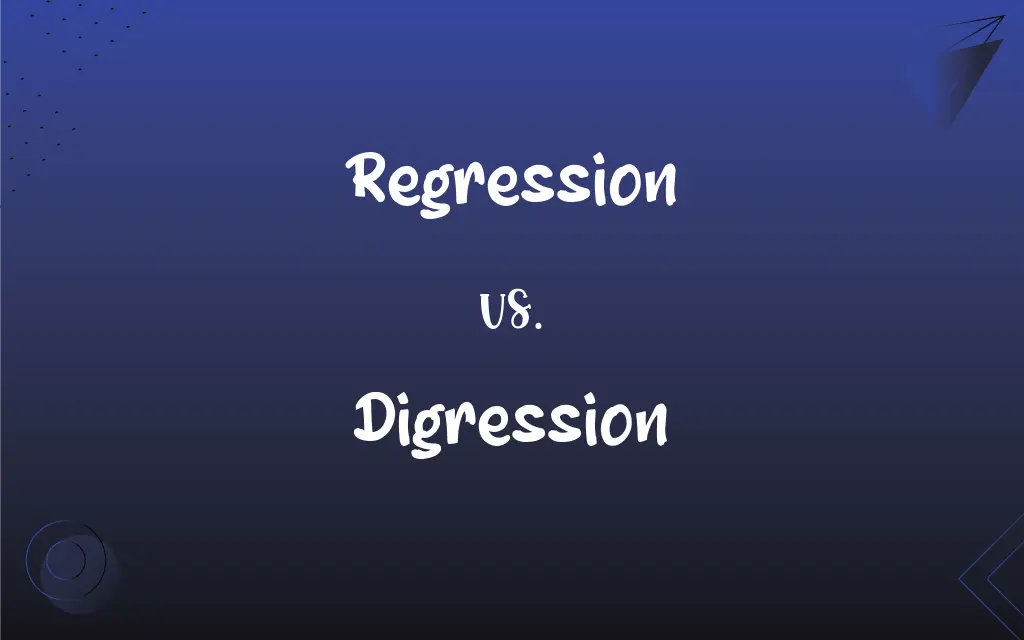Regression vs. Digression: What's the Difference?
Edited by Aimie Carlson || By Janet White || Updated on October 8, 2023
Regression vs. Digression: "Regression" refers to returning to a previous state, while "Digression" means deviating from the main topic.

Key Differences
"Regression" and "Digression" are two words that, while related to the idea of moving away from a current position, carry distinct meanings. Regression focuses on a return or backward movement to a former or less developed state, often used in psychology or statistics. On the other hand, digression is about moving away from the main subject of discussion, typically within speech or writing.
In psychology, the term "regression" describes a defense mechanism where individuals revert to an earlier developmental stage, showcasing behaviors from a younger age. Digression in communication, however, doesn't involve any backward movement but is a temporary departure from the main topic, often providing additional, albeit not central, information.
In the realm of statistics, "regression" denotes a type of analysis aiming to predict the value of a dependent variable based on the value(s) of one or more independent variables. In literary or rhetorical contexts, "digression" portrays an intentional movement away from the central narrative or argument, often to provide background or anecdotal information.
Notably, while regression always indicates some form of return or backward progression, digression doesn't imply any return. A digression can be a one-time detour in a conversation or story, whereas regression suggests a revert to a previous state or condition.
In everyday use, "regression" might describe someone reverting to old habits or behaviors, suggesting a lack of progress or growth. Conversely, "digression" might be used to describe a speaker who often goes off-topic, perhaps entertainingly so, without necessarily returning to an earlier discussion point.
ADVERTISEMENT
Comparison Chart
Definition
Return to a former or less advanced state
Departure from the main subject in speech or writing
Common Usage
Psychology, statistics
Rhetoric, literature
Direction
Backward or return
Sideways or off-topic
Implication
Lack of progress or development
Temporary or tangential departure
Temporality
Can be long-term or permanent
Typically short-term or temporary
ADVERTISEMENT
Regression and Digression Definitions
Regression
A return to a previous state.
After years of progress, his sudden regression was alarming.*
Digression
A temporary departure from the main subject.
His story was interesting, but full of digressions.*
Regression
A decline to a less perfect or developed state.
The city's regression in infrastructure was evident.*
Digression
A passage or section that deviates from a theme.
The play's digression into fantasy was a delightful surprise.*
Regression
A defense mechanism in psychology, reverting to an earlier developmental stage.
Under stress, she displayed regression by acting childishly.*
Digression
A section in a text that deviates from the central theme.
The author's digression about her childhood was unexpected but enlightening.*
Regression
Moving backward in position or time.
The film's narrative had a regression, revisiting the protagonist's past.*
Digression
Moving away from the central point or argument.
My professor is known for his long digressions during lectures.*
Regression
The process or an instance of regressing, as to a less perfect or less developed state.
Digression
A diversion or deviation.
The tour included a pleasant digression to a nearby village.*
Regression
(Psychology) In psychoanalytic theory, reversion to an earlier or less mature stage of psychological development.
Digression
The act of digressing.
Regression
(Medicine) Subsidence of the symptoms or process of a disease.
Digression
An instance of digressing, especially a written or spoken passage that has no bearing on the main subject.
Regression
(Statistics) A technique for predicting the value of a dependent variable as a function of one or more independent variables in the presence of random error.
Digression
An aside, an act of straying from the main subject in speech or writing.
The lectures included lengthy digressions on topics ranging from the professor's dog to the meaning of life.
Regression
(Astronomy) Retrograde motion of a celestial body.
Digression
The act of straying from the main subject in speech or writing, (rhetoric) particularly for rhetorical effect.
Make digression... by way of digression...
Regression
(Geology) A relative fall in sea level resulting in deposition of terrestrial strata over marine strata.
Digression
(obsolete) A deviancy, a sin or error, an act of straying from the path of righteousness or a general rule.
Regression
An action of regressing, a return to a previous state.
Digression
A deviation, an act of straying from a path.
Regression
An action of travelling mentally back in time.
Digression
An elongation, a deflection or deviation from a mean position or expected path.
Regression
(psychotherapy) A psychotherapeutic method whereby healing is facilitated by inducing the patient to act out behaviour typical of an earlier developmental stage.
Digression
The act of digressing or deviating, esp. from the main subject of a discourse; hence, a part of a discourse deviating from its main design or subject.
The digressions I can not excuse otherwise, than by the confidence that no man will read them.
Regression
(statistics) An analytic method to measure the association of one or more independent variables with a dependent variable.
Digression
A turning aside from the right path; transgression; offense.
Then my digression is so vile, so base,That it will live engraven in my face.
Regression
(statistics) An equation using specified and associated data for two or more variables such that one variable can be estimated from the remaining variable(s). Category:en:Functions
Digression
The elongation, or angular distance from the sun; - said chiefly of the inferior planets.
Regression
(programming) The reappearance of a bug in a piece of software that had previously been fixed.
Digression
A message that departs from the main subject
Regression
(medicine) The diminishing of a cellular mass like a tumor, or of an organ size.
Digression
A turning aside (of your course or attention or concern);
A diversion from the main highway
A digression into irrelevant details
A deflection from his goal
Regression
(exercise) The making an exercise less straining to perform by manipulating the details of its performance like loaded weight, range of motion, angle, speed.
Digression
Wandering from the main path of a journey
Regression
The act of passing back or returning; retrogression; retrogradation.
Regression
An abnormal state in which development has stopped prematurely
Regression
(psychiatry) a defense mechanism in which you flee from reality by assuming a more infantile state
Regression
The relation between selected values of x and observed values of y (from which the most probable value of y can be predicted for any value of x)
Regression
Returning to a former state
Regression
In statistics, predicting values based on variables.
Linear regression was used to forecast sales based on past data.*
FAQs
Does "regression" always indicate a negative return?
Typically, but it can be neutral, as in statistical regression.
In statistics, is regression analysis always linear?
No, there are multiple forms, including multiple and logistic regression.
Is "digression" the opposite of "progression"?
Not exactly. While progression means moving forward, digression is moving off-topic, not necessarily backward.
Can both "regression" and "digression" be used in everyday speech?
Yes, regression can mean reverting in behavior, and digression can mean straying from a topic.
Can regression indicate growth or progress?
Generally, it denotes a return or backward movement, often seen as a lack of growth.
Is a "digression" always intentional in speeches?
Not always. Sometimes speakers might unintentionally stray from their main point.
Is "digression" always unwanted in discussions?
Not always. Digressions can offer valuable or entertaining insights, depending on context.
Can a story have both regression and digression?
Absolutely. A narrative might revisit past events (regression) and include unrelated anecdotes (digression).
In therapy, how might regression manifest?
An individual might revert to childlike behaviors or earlier coping mechanisms.
Are all digressions in literature irrelevant?
No, they can provide depth, background, or character insights, even if not central to the plot.
Does regression in one's behavior indicate a psychological disorder?
Not necessarily. While it can be a symptom, temporary regression can occur in stressful situations.
Can a digression lead back to the main topic effectively?
Yes, skillful speakers or writers can use digressions to enhance and then refocus on the main topic.
Are "regression" and "recession" similar?
While both imply a backward movement, "regression" is broader, whereas "recession" often refers to economic decline.
Do digressions weaken an argument?
It depends. Relevant digressions can strengthen, but excessive ones might dilute the main point.
Is childhood regression normal?
It can be. Children might regress in behaviors, like thumb-sucking, during stressful times.
Is a "digression" an error in writing?
Not inherently. It can be a stylistic choice, but excessive digressions might confuse readers.
Does digression disrupt the flow of a conversation?
It can, but it can also enhance or add depth depending on its relevance and delivery.
Can a digression be the highlight of a story?
Absolutely. Some memorable moments in literature and speeches are digressions from the main narrative.
Can "regression" refer to technological or societal states?
Yes, it can denote a return to less advanced or previous conditions.
In regression analysis, what's predicted?
A dependent variable's value based on one or more independent variables.
About Author
Written by
Janet WhiteJanet White has been an esteemed writer and blogger for Difference Wiki. Holding a Master's degree in Science and Medical Journalism from the prestigious Boston University, she has consistently demonstrated her expertise and passion for her field. When she's not immersed in her work, Janet relishes her time exercising, delving into a good book, and cherishing moments with friends and family.
Edited by
Aimie CarlsonAimie Carlson, holding a master's degree in English literature, is a fervent English language enthusiast. She lends her writing talents to Difference Wiki, a prominent website that specializes in comparisons, offering readers insightful analyses that both captivate and inform.































































